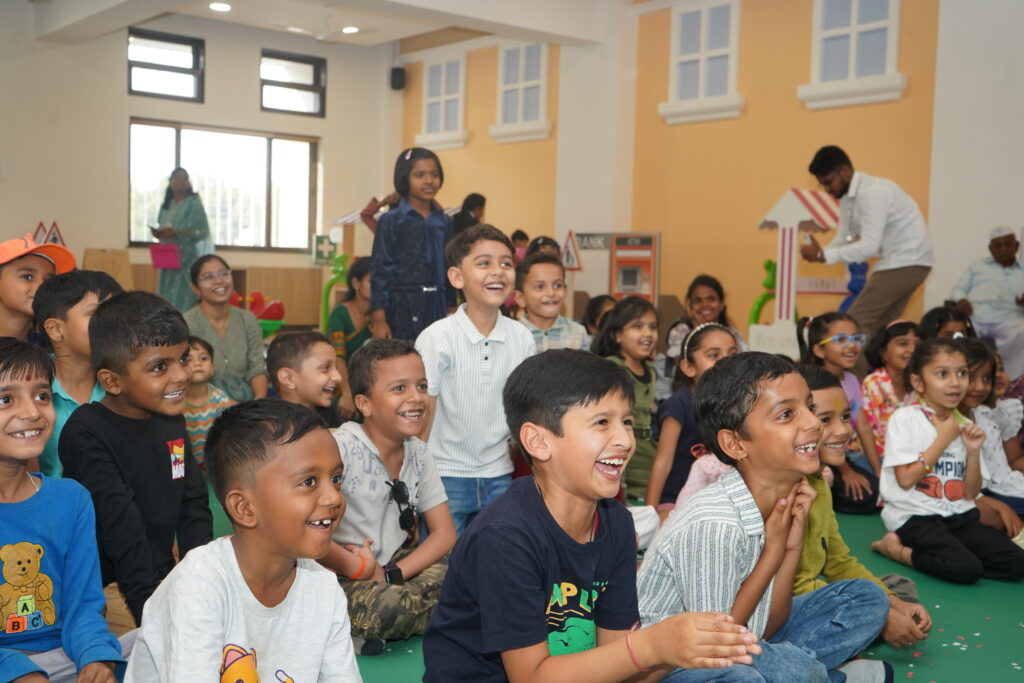Table of Contents
Introduction
Early Childhood Education begins the moment your child steps into a school classroom with a curious heart, marking the start of an exciting learning journey.
A child’s educational career begins in preschool, which includes more than just teaching them letters and numbers. It is about setting a foundation for their personal growth. As parents, you may also think it is the best choice to admit your child to preschool. Right?

In this blog, we will explain eight key benefits of preschool for early childhood education, where preschool helps your child in their personal growth and cognitive skills. These advantages will demonstrate how preschool fosters your child’s development and prepares them for life’s challenges.
1. Social Skills Development
Preschool provides your child with the best environment for growth where they learn and practice social skills in a playful setting.
These early childhood years are crucial for their social connections. In preschool, children naturally interact with their peers through:
1. Group Activities
2. Different Games
3. Teamwork Challenges
4. Storytelling Sessions
These simple activities teach them how to build positive relationships with other children.
2. Emotional Development
Emotional development is the most beneficial component of early childhood education. Thus, preschool provides a safe and supportive environment where your child explores their feelings and expresses them in positive ways.
Preschool emotional development includes:
1. Recognizing Emotions
2. Managing Frustration
3. Building Empathy
4. Developing Self-regulation
As your child continues to grow emotionally in preschool, they also gain greater confidence in themselves.
3. Improved Cognitive Skills
Preschool plays an important role in enhancing your child’s cognitive abilities, which include thinking, learning, and problem-solving. In preschool, your child explores various activities, including math games, storytelling, and group activities, which promote brain growth and prepare children for further education.

In preschool, children explore new concepts, gain knowledge from their experiences, and establish a strong foundation in fundamental abilities for early childhood education.
4. Enhanced Language Skills
Preschool helps your child enhance their language skills for effective communication. Preschool improves language skills in several important ways, including:
1. Storytelling activities
2. Singing songs
3. Conversations with teachers and peers
4. Group discussions.
By participating in these activities, your child builds clear and effective communication and enhances their language skills, which helps them with early childhood education and beyond.
5. Empowering Self-confidence
Preschool promotes children’s independence, which is one of the main advantages of their growth.
In preschool, children make choices, such as choosing games or different activities, such as choosing a color. These small decisions empower them to feel a sense of control over their day-to-day life and help them realize that their choices matter.
Key ways to promote independence include:
1. Making Choices
2. Completing Tasks
3. Taking Responsibility
4. Building Self-confidence
These key ways nurture your child in preschool and encourage them to approach new challenges with a positive mindset.
6. Provides Structured Learning
Preschool provides your child with structured learning so that your child understands the flow of a learning day. These structured routines include activities such as circle time, group lessons, snack time, and playtime, all organized predictably.
Structured learning teaches your child the value of rules and respecting boundaries. Plus, it helps develop critical skills such as focusing on tasks, following instructions and completing activities.
It cultivates a positive attitude toward learning while giving kids the self-control, concentration, and organizational abilities they need to succeed in any learning environment.
7. Boosts Creativity and Imagination
Creativity is about encouraging your child to think outside the box, solve problems, and envision possibilities. Children develop lifelong critical thinking and creativity skills when they participate in these types of activities.
Creativity and imagination include:
1. Art and crafts
2. Storytelling and role-play
3. Building and designing
4. Free play.

In addition, preschool prepares them for success in both school and life by giving them the skills they need to make those goals come true.
8. A Sense of Belonging
Preschool plays a significant role in helping children develop a strong sense of belonging in the community.
The benefits of cultivating a sense of belonging include:
1. Social Confidence
2. Emotional Intelligence
3. Respect for Diversity
4. Community Awareness.
Preschool essentially teaches your child the first introduction to the value of living in a welcoming and inclusive society.
Conclusion
Preschool provides your child with an extensive learning environment that promotes every aspect of your child’s growth. Early childhood education helps your child become a confident and independent learner, which sets a solid foundation for your child’s future.
As parents, selecting a preschool for your child is an investment in their personal and professional development because it provides a safe and engaging environment where your child can explore, learn, and thrive.
Godavari Public School is the best preschool in Adgaon, Nashik, dedicated to nurturing next-generation leaders, thinkers, and innovators. With its aspiring CBSE-affiliated school, it provides a thriving and safe learning environment for your child. Admissions are open for the academic year, with enrollment ranging from nursery to sixth grade. Choose the best education for your child because it is a crucial step for their success in life
FAQ’s
– What is early childhood education?
Early childhood education is the initial journey of your child’s future, focusing on emotional, social, and physical development. It also develops curiosity and critical life skills and sets the foundation for your child’s academic and personal success.
– Why is early childhood education important?
The secret of awakening your child’s future potential is early childhood education. It nurtures your child for lifelong skills, teaches values, and additionally shapes their future. This early education gives them the self-assurance they need to thrive in a changing world.
– What is the main purpose of preschool?
The purpose of preschool is to support a child’s development by nurturing their independence and social skills, which build a strong foundation for their academic learning through different activities and a playful environment.
– What is the right age for early childhood education?
The right age for early childhood education covers the period up to 8 years of age, which is most helpful for your child’s academic learning. This phase provides the foundation for overall growth.



